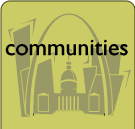| home | our mission | contact us | issue archive |

Mar 2005 / communities :: email this story to a friend

Who Are the People in Our Neighborhoods?
By Amanda E. DoyleI'll never forget the first time I went to the SLACO conference: that particular year, Ray Suarez was the keynote speaker and, being the public-radio nerdlette that I am, I swooned to imagine hearing directly from one of my favorite journalists, as he spoke about his hot new book that was so relevant it even included a chapter all about St. Louis. Besides Suarez, I also went to sessions about new Americans and the work of the International Institute (I took copious notes during that one, and still refer to them once in a while), neighborhood crime watches and plenty of other practical and inspiring workshops. Everything seemed so, well, applicable. I was excited to go home to my house, my block, my hood and make it all better.
Fast forward several years: lots of things are pretty great about my neighborhood, but of late, my husband, some neighbors and I have gotten pissed off about the amoral speculators (not all, but mostly, folks with a 636 area code who probably heard a get-rich-quick in the poor, hapless city spiel) who are buying foreclosed properties and flipping them back and forth, managing to make handsome profits while their buildings fall apart and remain unoccupied. Boiling mad, we are. And while I was in that state, a copy of the workshop topics for this year's 10th Annual St. Louis Association of Community Organizations Conference came my way; topping the list of the Housing Workshops track? "Threats to Stable Neighborhoods: Predatory Lending and Speculation." Bingo.
Each year, the SLACO conference brings together neighborhood activists, elected and appointed city officials, various folks from related private-sector enterprises, nonprofits and others who are concerned about getting their neighborhoods and, ultimately, our city, to a stable place...and then keeping it there. It's a hothouse for making contacts, sharing ideas and gathering inspiration from the successes of others.
Among the many topics on this year's agenda: green building, the city's current land use plan (presented by planning wonder-boy Rollin Stanley, this should have a rock-star aura about it), efforts to reduce lead exposure, neighborhood health initiatives, problem property abatement, fundraising and marketing for neighborhoods, public education, diversity and business district development. Taken together, the workshops — along with the keynote speeches, lunchtime discussions and casual interactions — represent just about every facet of what it means to live in community.
Add that to a remarkably low price, a groaning spread of food all day long and a wrap-up performance by the Make a Difference Center Step Team and, well, I can't believe you're still sitting there reading this. You should be out inviting all your neighbors right now.
Amanda E. Doyle thinks she's a pretty good neighbor — but there's always room for improvement.
Church and State | Games | Expatriates | Communities | From the Source
It's All Happening | Young Minds | The Ordinary Eye | Elsewhere
Sights and Sounds | Media Shoegaze | A Day's Work | From the Editor
© 2005 The Commonspace
